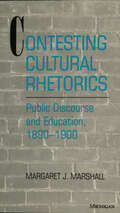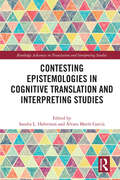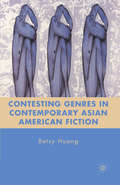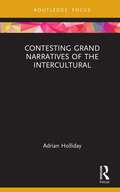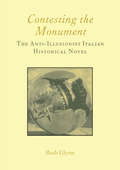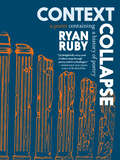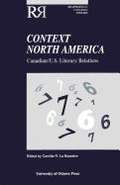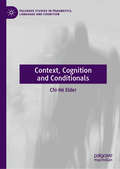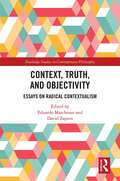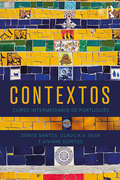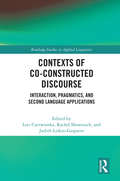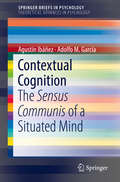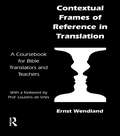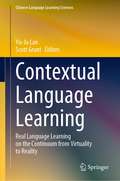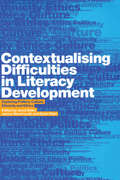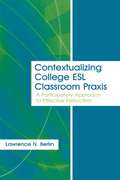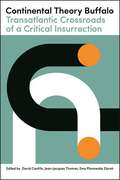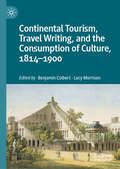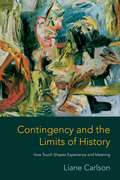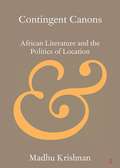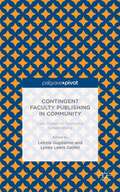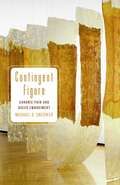- Table View
- List View
Contesting Cultural Rhetorics: Public Discourse and Education, 1890-1900
by Margaret J. MarshallContesting Cultural Rhetorics is a groundbreaking and original study that demonstrates how "education" is viewed as a contested term and a set of contested practices in American culture because it is inevitably linked to highly contested, value-laden terms. An examination of the public discourse of education not only reveals the ideologies and conceptions embedded in educative acts and institutions but also provides a means of examining how education itself functions in American culture as a site of contest between ideologies, values, and the constitution of individual and nation. Margaret J. Marshall's analysis employs a range of contemporary theorists from Bakhtin to Foucault and draws on a number of disciplinary perspectives, including law, history, and ethnography, where scholars have been examining discursive practices and where rhetoric is understood to be a means of examining cultural conceptions and embedded ideologies. Through these lenses she examines four influential and popular texts of the 1890s that serve to illuminate current public debates on education: Joseph Mayer Rice's articles in Forum, a well-respected magazine; Matthew Arnold's introduction to a government report; W. E. B. Du Bois's "A Negro Schoolmaster in the New South;" and Jane Addams's "A Function of the Social Settlement." Neither a history of education nor a typical literary analysis of the texts in question, this book considers the rhetorical stance of authors, the constitution of audience and subject, and the use of references and narratives as devices of authority. Taken together, these texts reveal the complicated public discussion of education in the 1890s—a period of transformation in culture, schooling, and the organization of knowledge. Moreover, they reveal the rhetorical structure of many of the questions Americans ask about education today: who should be educated, by whom, for what purposes, using what methods or materials? What of the past should we pass on to the future, and how? Contesting Cultural Rhetorics will be useful to readers interested in the history of education and nineteenth-century popular culture, as well as those involved in current debates on education and public policy.
Contesting Epistemologies in Cognitive Translation and Interpreting Studies (Routledge Advances in Translation and Interpreting Studies)
by Sandra L. Halverson Álvaro Marín GarcíaThis dynamic collection synthesizes and critically reflects on epistemological challenges and developments within Cognitive Translation and Interpreting Studies, problematizing a range of issues. These critical essays provide a means of encouraging further development by grounding new theories, stances, and best practices. The volume is a clear marker of a maturing discipline, as decades of empirical study and methodological innovation provide the backdrop for critique and debate. The volume exemplifies tendencies toward convergence and difference, while at the same time pushing against disciplinary boundaries and structures. Constructs such as expertise and process are explored, and different theories of cognition are brought to the table. A number of chapters consider what it might mean for translation to be a form of situated, or 4EA cognition, while others query interdisciplinary relationships of foundational importance to the field. Issues of methodology are also addressed in terms of their underlying philosophical assumptions and implications. This book will be of interest to scholars working at the intersection of translation and cognition, in such fields as translation studies, cognitive science, psycholinguistics, semiotics, and philosophy of science.
Contesting Genres in Contemporary Asian American Fiction
by Betsy HuangThis book examines the influence of genre on contemporary Asian American literary production. Drawing on cultural theories of representation, social theories of identity, and poststructuralist genre theory, this study shows how popular prose fictions have severely constrained the development of Asian American literary aesthetics.
Contesting Grand Narratives of the Intercultural (Routledge Focus on Applied Linguistics)
by Adrian HollidayContesting Grand Narratives of the Intercultural uses an autoethnographic account of the author’s experience of living in Iran in the 1970s to demonstrate the constant struggle to prevent the intercultural from being dominated by essentialist grand narratives that falsely define us within separate, bounded national or civilisational cultures. This book provides critical insight that: DeCentres how we encounter and research the intercultural by means of a third-space methodology Recovers the figurative, creative, flowing, and boundary-dissolving power of culture Recognises hybrid integration which enables us the choice and agency to be ourselves with others in intercultural settings Demonstrates how early native-speakerism pulls us back to essentialist large-culture blocks. Aimed at students and researchers in applied linguistics, intercultural studies, sociology, and education, this volume shows how cultural difference in stories, personal space, language, practices, and values generates unexpected and transcendent threads of experience to which we can all relate within small culture formation on the go.
Contesting the Monument: The Anti-illusionist Italian Historical Novel
by Ruth Glynn"In the second half of the twentieth century, the Italian historical novel provided an unrivalled number of best sellers and publishing 'phenomena'. The success of the genre is closely related to a more general interest in revisiting the past in the light of a changed understanding of the nature, or philosophy, of history. This study aims to explore the particularly marked increase in the production and popularity of the historical novel in the period between the mid-1960s and the early 1990s, with reference to current debates on the nature of history. It presents a theoretical framework which establishes the centrality of philosophy of history to the development of the genre. The employment of this framework opens out the discussion of literary change to the consideration of historiographical developments and wider critical debate. The theoretical insights gained inform the close textual analysis provided in the chapters dealing with novels written by five of Italy's foremost contemporary writers: Leonardo Sciascia, Vincenzo Consolo, Sebastiano Vassalli, Umberto Eco, and Luigi Malerba."
Context Clues: Reading Comprehension Activities (Reading Level 3.5 - 5.0)
by EdupressReinforce critical reading skills with a diverse range of classroom activities! Detailed teacher instruction pages. Leveled reading passages and reproducible activities. Individual, small-group and whole-class activities.
Context Collapse: A Poem Containing a History of Poetry
by Ryan RubyLiterary critic Ryan Ruby uncovers the secret history of poetry in a mock-academic verse essay filled with wit and wisdom.One of Publishers Weekly's Best Books of 2024Prophet. Entertainer. Courtier. Criminal. Revolutionary. Critic. Scholar. Nobody. Epic in sweep, Context Collapse is the secret history of the poet—from Bronze Age Greece and Renaissance Italy to the cafés of Grub Street and the Latin Quarter, from the creative writing departments of the American Midwest to the boardrooms of Silicon Valley. Cheekily introducing academic discourse, media studies, cybersemiotics, literary sociology, and heterodox economics into his blank verse study of poetry, Ruby traces the always delicate dance between poets, their publishers, and their audiences, and shows how, time and time again, the social, technological, and aesthetic experiments that appear in poetic language have prefigured radical changes to the ways of life of millions of people. It is precisely to poets to whom we ought to turn to catch a glimpse, as Shelley once put it, of the &“gigantic shadows futurity casts on the present.&”
Context North America: Canadian/U. S. Literary Relations
by Camille R. La BossiereThis book is a comparative study of Canadian and American literary relations that emphasizes the cultural and institutional contexts in which Canadian literature is taught and read.
Context, Cognition and Conditionals (Palgrave Studies in Pragmatics, Language and Cognition)
by Chi-Hé ElderThis book proposes a semantic theory of conditionals that can account for (i) the variability in usages that conditional sentences can be put; and (ii) both conditional sentences of the form ‘if p, q’ and those conditional thoughts that are expressed without using ‘if’. It presents theoretical arguments as well as empirical evidence from English and other languages in support of the thesis that an adequate study of conditionals has to go beyond an analysis of specific sentence forms or lexical items. The resulting perspective on conditionals is one in which conditionality is located at a higher level than that of the sentence; namely, at the level of thought. The author argues that it is only through adopting such a perspective, and with it, a commitment to context-dependent semantics, that we can successfully represent conditional utterances as they are used and understood by ordinary language users. It will be of interest to students and scholars working on the semantics of conditionals in the fields of linguistics (especially semantics and pragmatics) and philosophy of language.
Context, Truth and Objectivity: Essays on Radical Contextualism (Routledge Studies in Contemporary Philosophy)
by Eduardo Marchesan David ZaperoThe claim according to which there is a categorial gap between meaning and saying – between what sentences mean and what we say by using them on particular occasions – has come to be widely regarded as being exclusively a claim in the philosophy of language. The present essay collection takes a different approach to these issues. It seeks to explore the ways in which that claim – as defended first by ordinary language philosophy and, more recently, by various contextualist projects – is grounded in considerations that transcend the philosophy of language. More specifically, the volume seeks to explore how that claim is inextricably linked to considerations about the nature of truth and representation. It is thus part of the objective of this volume to rethink the current way of framing the debates on these issues. By framing the debate in terms of an opposition between "ideal language theorists" and their semanticist heirs on the one hand and "communication theorists" and their contextualist heirs on the other, one brackets important controversies and risks obscuring the undoubtedly very real oppositions that exist between different currents of thought.
Contextos: Curso Intermediario De Portugues
by Denise Santos Glaucia Silva Viviane GontijoContextos: Curso Intermediário de Português is an engaging and motivating course that takes learners from the intermediate to advanced level. The course allows students to systematically practise all four language skills as well as develop intercultural awareness. Each unit contains clear learning objectives linked to recognised standards as well as self-assessment checklists and review plans. This supports students to become autonomous learners by tracking their own progress and focusing on specific areas of difficulty. A companion website provides an interactive workbook with additional grammar and vocabulary practice to reinforce those within the book, as well as the audio to accompany the course. The course takes learners from the intermediate-low to advanced-low according to the ACTFL proficiency guidelines and from A2 to B2 according to the CEFR.
Contexts for Hawthorne: The Marble Faun and the Politics of Openness and Closure in American Literature
by Milton R. SternWhere does the Marble Faun fit in Hawthorne's canon?
Contexts of Co-Constructed Discourse: Interaction, Pragmatics, and Second Language Applications (Routledge Studies in Applied Linguistics)
by Lori CzerwionkaThis collection showcases cutting-edge developments in co-construction in discourse. Drawing on the pioneering work of Dale A. Koike, the volume contributes new understandings of how speakers jointly negotiate meanings, contexts, identities, and social positions in interaction. The volume is organized around three key themes in co-construction—co-constructed discourse, pragmatics in discourse, and teaching and assessment of discourse—and builds on the introductory chapter that situates the discussion on context and co-construction as fundamental to understanding meaning-making in interaction. Drawing on interdisciplinary perspectives across strands of linguistics and education, chapters explore both the contextual elements that frame co-construction processes and the distinct dynamics between action and language use across a wide range of interactional contexts, including sports commentary, interviews, everyday conversation, classroom discourse, and digitally mediated settings. Taken together, the book highlights the impact of Koike’s contributions on existing research in pragmatics and discourse and exhibits the potential for her work to frame scholarship on emerging interactional contexts. This volume will be of particular interest to students and researchers in discourse studies, pragmatics, applied linguistics, second language studies, and language education, as well as those interested in interaction across diverse contexts.
Contextual Cognition: The Sensus Communis of a Situated Mind (SpringerBriefs in Psychology)
by Agustín Ibáñez Adolfo M. GarcíaThis Brief introduces two empirically grounded models of situated mental phenomena: contextual social cognition (the collection of psychological processes underlying context-dependent social behavior) and action-language coupling (the integration of ongoing actions with movement-related verbal information). It combines behavioral, neuroscientific, and neuropsychiatric perspectives to forge a novel view of contextual influences on active, multi-domain processes. Chapters highlight the models' translational potential for the clinical field by focusing on diseases compromising social cognition (mainly illustrated by behavioral variant frontotemporal dementia) and motor skills (crucially, Parkinson’s disease). A final chapter sets forth metatheoretical considerations regarding intercognition, the constant binding of processes triggered by environmental and body-internal sources, which confers a sensus communis to our experience. In addition, the book includes two commentaries written by external peers pondering on advantages and limits of the proposal. Contextual Cognition will be of interest to students, teachers, and researchers from the fields of cognitive science, neurology, psychiatry, neuroscience, psychology, behavioral science, linguistics, and philosophy.
Contextual Frames of Reference in Translation: A Coursebook for Bible Translators and Teachers
by Ernst WendlandBible translation theory and practice rightly tend to focus on the actual text of Scripture. But many diverse, yet interrelated contextual factors also play an important part in the implementation of a successful translation program. The aim of this coursebook is to explore, in varying degrees of detail, a wide range of these crucial situational variables and potential influences, using a multidisciplinary approach to the task. Thus, in order to expand and enrich the field of vision, a progressive study of this complex process of intercultural, interlinguistic communication is carried out according to a set of overlapping sociocultural, organizational and situational cognitive orientations. These contextual factors provide a broader frame of reference for analyzing, interpreting and communicating the original Scriptures in a completely new, contemporary setting of transmission and reception. The three dimensions are then applied in a practical way to explore the dramatic "throne-room" vision of the Apostle John (Revelation 4-5) with reference to both the original Greek text and also a modern dynamic translation in Chewa, a southeastern Bantu language of Africa. A variety of exercises and assignments to stimulate critical and creative reflection as well as to illustrate the theoretical development of Contextual Frames of Reference is provided every step of the way. Not only is translation per se discussed, but the teaching and evaluation of translated texts and versions are also considered from several points of view in the final three chapters. An Appendix offers a foundational essay by Professor Lourens de Vries on the subject of primary orality and the influence of this vital factor in the crosscultural communication of the Bible.
Contextual Language Learning: Real Language Learning on the Continuum from Virtuality to Reality (Chinese Language Learning Sciences)
by Yu-Ju Lan Scott GrantThis book presents research and developments in the virtual, augmented technology and mixed-reality used in language learning and teaching. It provides the readers with a comprehensive overview of contextual language learning with the support of immersive technology. From theoretical foundations, methodological issues, the features of virtual and augmented reality, and educational practices of language learning, to the future of immersive technology for and research on language learning. During the past two decades, abundant research on different realities has recognized the potential of language learning in virtual, augmented, and mixed-reality environments (Wang et al., 2020; Lin & Lan, 2015). Given insufficient studies of Chinese learning in immersive contexts reported in existing literature, this book includes several excellent studies about using immersive technologies for Chinese learning in addition to other foreign langue learning, such as English as a foreign language (EFL). Since learning Chinese has grown significantly as a global trend, the authors vitally consolidate and synthesize various theoretical foundations, visions, and recent research and practices in the context of Chinese teaching from broader and more diverse perspectives. On the other hand, the chapters about EFL learning also shed light on the research on contextual language learning. Thus, the chapters included in this book will likely provide readers with a deep and extensive understanding of the potential of the smart combination of immersive technologies and language learning. More issues for future research will undoubtedly be inspired by reading the chapters in this book.
Contextualising Difficulties in Literacy Development: Exploring Politics, Culture, Ethnicity and Ethics
by Gavin Reid Janet Soler Janice WearmouthThis book provides a range of interdisciplinary and international perspectives on difficulties in literacy development. The high-profile team of contributors provide ethical and policy discussions, as well as contextualising individual and collective strategies to addressing difficulties in literacy development. The chapters break new ground by encompassing a wide range of perspectives related to critical literacy, socio-cultural, cognitive, and psychological viewpoints, to help inform practice, policy and research into literacy difficulties. Issues addressed include: *the different ways literacy can be conceptualised through social-science based disciplinary perspectives*the issues at the centre of current public and professional debates surrounding literacy difficulties and how these have impacted upon pedagogical responses *the impact of these wider political and social issues on individual students. This reader forms the basis of the Open University’s Difficulties in Literacy Development course, but will also be of interest to postgraduate students, teachers, researchers, education professionals and policymakers who are keen to address difficulties in literacy development.
Contextualizing College ESL Classroom Praxis: A Participatory Approach to Effective Instruction (Language, Culture, And Teaching Ser.)
by Lawrence N. BerlinContextualizing College ESL Classroom Praxis: A Participatory Approach to Effective Instruction provides pre-service and in-service teachers with a model for engaging in effective instruction with the variety of students encountered in college English as a second language or foreign language classrooms. Along with the model, the text is designed to
Continental Theory Buffalo: Transatlantic Crossroads of a Critical Insurrection (SUNY series, Humanities to the Rescue)
by David R. Castillo, Jean-Jacques Thomas, Ewa Plonowska ZiarekContinental Theory Buffalo is the inaugural volume of the Humanities to the Rescue book series, a public humanities project dedicated to discussing the role of the arts and humanities today. This book is a collaborative act of humanistic renewal that builds on the transcontinental legacy of May 1968 to offer insightful readings of the cultural (d)evolution of the last fifty years. The volume contributors revisit, reclaim and reassess the "revolutionary" legacy of May 1968 in light of the urgency of the present and the future. Their essays are effective illustrations of the potential of such interpretive traditions as philosophy, literature and cultural criticism to run interference with (and offer alternatives to) the instrumentalist logic and predatory structures that are reducing the world to a collection of quantifiable and tradeable resources. The book will be of interest to cultural historians and theorists, media studies scholars, political scientists, and students of French and Francophone literature and culture on both sides of the Atlantic.
Continental Tourism, Travel Writing, and the Consumption of Culture, 1814–1900
by Benjamin Colbert Lucy MorrisonThis book explores the boundaries of British continental travel and tourism in the nineteenth century, stretching from Norway to Bulgaria, from visitors’ albums to missionary efforts, from juvenilia to joint authorship. The essay topics invoke new aesthetics of travel as consumption, travel as satire, and of the developing culture of tourism. Chronologically arranged, the book charts the growth and permutations of this new consumerist ideology of travel driven by the desires of both men and women: the insatiable appetite for new accounts of old routes as well as appropriation of the new; interart reproductions of description and illustration; and wider cultural manifestations of tourism within popular entertainment and domestic settings. Continental tourism provides multiple perspectives with wide-ranging coverage of cultural phenomena increasingly incorporated into and affected by the nineteenth-century continental tour. The essays suggest the coextension of travel alongside experiential boundaries and reveal the emergence of a consumerist attitude toward travel that persists in the present day.
Contingency and the Limits of History: How Touch Shapes Experience and Meaning
by Liane CarlsonCentral to the historicizing work of recent decades has been the concept of contingency, the realm of chance, change, and the unnecessary. Following Nietzsche and Foucault, genealogists have deployed contingency to show that all institutions and ideas could have been otherwise as a critique of the status quo. Yet scholars have spent very little time considering the genealogy of contingency itself—or what its history means for its role in politics.In Contingency and the Limits of History, Liane Carlson historicizes contingency by tying it to its theological and etymological roots in “touch,” contending that much of its critical, disruptive power is specific to our current historical moment. She returns to an older definition of contingency found in Christian theology that understands it as the lot of mortal creatures, who suffer, feel, bleed, and change, in contrast to a necessary, unchanging, impassible God. Far from dying out, Carlson reveals, this theological past persists in continental philosophy, where thinkers such as Novalis, Schelling, Merleau-Ponty, and Serres have imagined contingency as a type of radical destabilization brought about by the body’s collision with a changing world. Through studies of sickness, loneliness, violation, and love, she shows that different experiences of contingency can lead to dramatically dissimilar ethical and political projects. A strikingly original reconsideration of one of continental philosophy and critical theory’s most cherished concepts, this book reveals the limits of historicist accounts.
Contingent Canons: African Literature and the Politics of Location (Elements in Publishing and Book Culture)
by Madhu KrishnanThis Element explores the mechanisms through which 'African literature', as a market category, has been consecrated within the global literary field. Drawing on archival, textual and field-based research, it proposes that the normative story of African literary writing has functioned to efface a broader material history of African literary production located on and oriented to the continent itself.
Contingent Faculty Publishing in Community: Case Studies for Successful Collaborations
by Lynée Lewis Gaillet Letizia GuglielmoContributors argue that the key to innovative teaching and scholarship lies in institutional support for the contingent labor force, and they encourage contingent faculty to organize self-mentoring groups, create venues for learning/disseminating their experiences and findings, and connect scholarship to service and teaching in novel ways.
Contingent Figure: Chronic Pain and Queer Embodiment
by Michael D. SnedikerA masterful synthesis of literary readings and poetic reflections, making profound contributions to our understanding of chronic painAt the intersection of queer theory and disability studies, acclaimed theorist Michael D. Snediker locates something unexpected: chronic pain. Starting from this paradigm-shifting insight, Snediker elaborates a bracing examination of the phenomenological peculiarity of disability, articulating a complex idiom of figuration as the lived substance of pain&’s quotidian. This lexicon helps us differently inhabit both the theoretical and phenomenal dimensions of chronic pain and suffering by illuminating where these modes are least distinguishable. Suffused with fastidious close readings, and girded by a remarkably complex understanding of phenomenal experience, Contingent Figure resides in the overlap between literary theory and lyric experiment. Snediker grounds his exploration of disability and chronic pain in dazzling close readings of Herman Melville, Emily Dickinson, Henry James, and many others. Its juxtaposition of these readings with candid autobiographical accounts makes Contingent Figure an exemplary instance of literary theory as a practice of lyric attention.Thoroughly rigorous and anything but predictable, this stirring inquiry leaves the reader with a rich critical vocabulary indebted to the likes of Maurice Blanchot, Gilles Deleuze, D. O. Winnicott, and Eve Kosofsky Sedgwick. A master class in close reading&’s inseparability from the urgency of lived experience, this book is essential for students and scholars of disability studies, queer theory, formalism, aesthetics, and the radical challenge of Emersonian poetics across the long American nineteenth century.
Contingent Pacifism
by Larry MayIn this, the first major philosophical study of contingent pacifism, Larry May offers a new account of pacifism from within the Just War tradition. Written in a non-technical style, the book features real-life examples from contemporary wars and applies a variety of approaches ranging from traditional pacifism and human rights to international law and conscientious objection. May considers a variety of thinkers and theories, including Hugo Grotius, Kant, Socrates, Seneca on restraint, Tertullian on moral purity, Erasmus's arguments against just war, and Hobbes's conception of public conscience. The guiding idea is that the possibility of a just war is conceded, but not at the current time or in the foreseeable future due to the nature of contemporary armed conflict and geopolitics - wars in the past are also unlikely to have been just wars. This volume will interest scholars and upper-level students of political philosophy, philosophy of law, and war studies.
